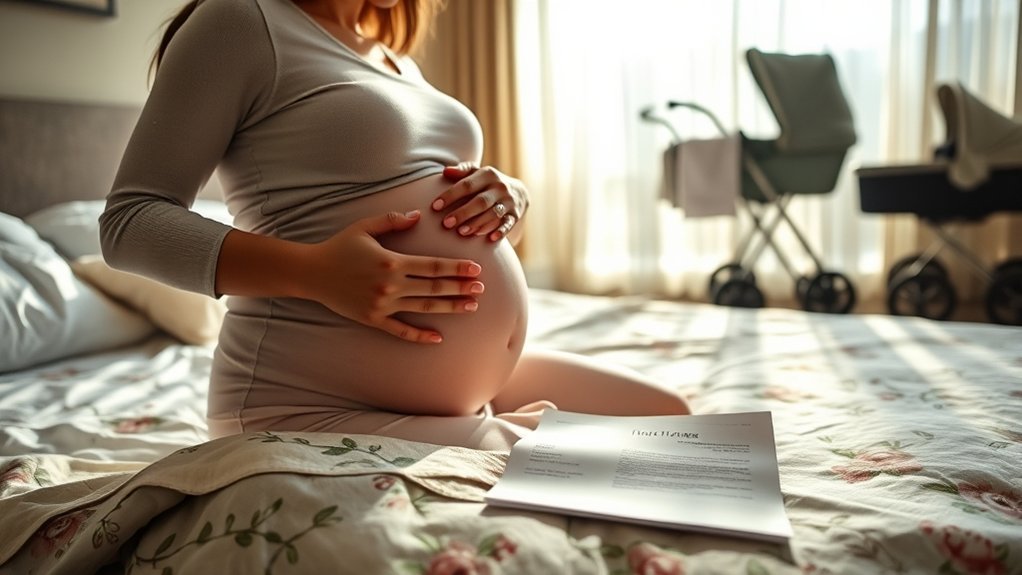Did you know that twin pregnancies often come with unique symptoms that can be more intense than those in a singleton pregnancy? It’s essential to stay vigilant about your body’s signals, as some changes may require prompt medical attention. Understanding when to reach out to your healthcare provider can profoundly impact your well-being and that of your babies. Let’s explore the common symptoms and identify the warning signs you shouldn’t ignore.
Common Symptoms of Twin Pregnancy
When you’re pregnant with twins, you might experience a range of symptoms that differ from a singleton pregnancy. Increased fatigue is common, as your body works harder to support two babies. You may also notice heightened nausea and vomiting, often referred to as hyperemesis gravidarum, which can be more severe than in single pregnancies. Additionally, you’re likely to experience rapid weight gain and a larger abdomen earlier on. Frequent urination can become more pronounced due to increased pressure on your bladder. You might also feel more pronounced fetal movements as the babies grow. Overall, these symptoms can be intense, but they’re essential indicators of your body adapting to nurture two little lives. Always consult your healthcare provider for personalized guidance and support.
When to Be Concerned About Fatigue
Although fatigue is a common symptom during twin pregnancies, there are specific instances when it can signal a more serious issue. If you find that your fatigue is severe and persistent, affecting your daily activities, it’s time to consult your doctor. Additionally, if you experience fatigue accompanied by shortness of breath, chest pain, or dizziness, seek medical attention immediately, as these could indicate conditions like anemia or gestational hypertension. It’s also essential to monitor any sudden changes in your fatigue levels, especially if you’re feeling unusually weak or lethargic. Remember, it’s always better to err on the side of caution; your health and the well-being of your babies should always come first.
Understanding Morning Sickness in Twin Pregnancies
Understanding morning sickness in twin pregnancies is vital, as it often proves to be more intense than in singleton pregnancies. You might experience nausea and vomiting that can disrupt your daily life. Here are some key points to reflect on:
- Increased Hormones: Higher levels of hormones, especially hCG, can lead to intensified symptoms.
- Timing: Morning sickness can occur at any time of day, not just in the morning.
- Hydration: Staying hydrated is essential; dehydration can worsen your symptoms.
- Dietary Adjustments: Small, frequent meals might help alleviate nausea.
If your morning sickness becomes severe or persistent, don’t hesitate to reach out to your healthcare provider. They can provide support and treatment options tailored to your needs.
Emotional Changes and Mental Health Tips
As you navigate the complexities of a twin pregnancy, it’s common to experience a range of emotional changes due to hormonal fluctuations and the added stress of carrying two babies. You might feel overwhelmed, anxious, or even sad at times. It’s important to acknowledge these feelings rather than dismiss them. Establishing a support system can be incredibly beneficial—talking to your partner, friends, or a therapist can help you process your emotions. Practicing self-care, such as engaging in light exercise, meditation, or journaling, can also improve your mental well-being. Remember, it’s okay to ask for help. Prioritizing your emotional health is essential for both you and your babies as you commence this unique journey.
Signs That Require Immediate Medical Attention
During a twin pregnancy, there are specific signs that require immediate medical attention to guarantee the safety of both you and your babies. If you experience any of the following symptoms, it’s essential to contact your healthcare provider right away:
- Severe abdominal pain or cramping
- Heavy vaginal bleeding
- Sudden swelling of hands, feet, or face
- Severe headaches or vision changes
These symptoms can indicate serious complications, such as preterm labor or gestational hypertension. Don’t hesitate to seek help if you’re concerned; your health and the health of your babies are paramount. Early intervention can make all the difference, so stay vigilant and trust your instincts throughout your pregnancy journey.
Frequently Asked Questions
Can Twin Pregnancies Affect My Diet or Nutrition Needs?
Yes, twin pregnancies considerably affect your diet and nutrition needs. You’ll require more calories, increased protein, and essential nutrients. Focus on balanced meals, hydration, and consulting your healthcare provider to confirm you’re meeting your growing babies’ needs.
How Does Exercise Change During a Twin Pregnancy?
During a twin pregnancy, you should focus on low-impact exercises like walking or swimming. It’s essential to listen to your body, adjust intensity, and consult your healthcare provider to guarantee you’re staying safe and healthy.
What Are the Risks of Preterm Labor in Twin Pregnancies?
In twin pregnancies, the risk of preterm labor markedly increases due to factors like uterine stretching and hormonal changes. You must monitor signs closely, as early intervention can protect both your babies and your health.
How Often Should I Schedule Prenatal Visits for Twins?
You should schedule prenatal visits every two to four weeks during the first trimester, every two weeks from 28 to 36 weeks, and weekly thereafter to monitor your health and your twins’ development closely.
Are There Specific Tests for Monitoring Twin Pregnancies?
About 30% of twin pregnancies face complications requiring specialized monitoring. You should expect ultrasounds, blood tests, and possibly genetic screenings to guarantee both babies are healthy. Regular check-ups are essential for your peace of mind and safety.
